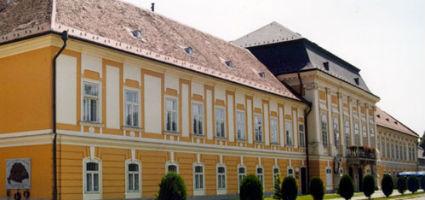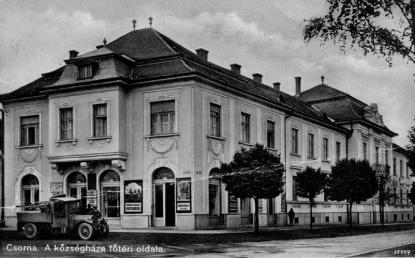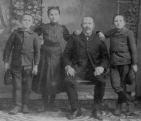2024. April 26. Friday
Museum of Csorna - Csorna
 |
Address: 9300, Csorna Szent István tér 34.
Phone number: (96) 261-527, (96) 593-190
E-mail: muzeum@csorna.hu
Opening hours: Tue (research day 9.30-13.30), Wed, Sat 9.30-15.30, Thu 10-18, Fri 9.30-15.30
The museum exhibits the researcher Tuesday is the day you can visit, but requires prior registration. |
The exhibition has closed for visitors.
2014.09.01. - 2015.08.28.
Museum tickets, service costs:
|
Ticket for adults
|
600 HUF
|
/ capita
|
|
Ticket for students
|
300 HUF
|
/ capita
|
|
Ticket for pensioners
|
300 HUF
|
/ capita
|
Our temporary exhibition on local history we show family photos of major Csorna residents and some depictions of buildings located in Csorna in the period of 1900-1950.

Through the photographs presented we may gain insight into life in Csorna in the first half of the twentieth century. The visitors will get to know some of the prestigious families then living in Csorna, eminent industrialists, traders, intellectuals as well as outstanding personalities of public life such as Alfréd Szupper, Jenő Detre, Hugó Énekes. We also present some photos of coppersmiths pastry and gingerbread makers-, builders, and also some photos of cereal and flour merchant families.
During the second half of the 19th century and the early 20th century, a significant number of farming families lived in Csorna. Their and their ancestors' lifestyle is reflected 19th century furniture to keep trousseau, such as chests decorated with tulips and also painted cabinets.

Through the photographs presented we may gain insight into life in Csorna in the first half of the twentieth century. The visitors will get to know some of the prestigious families then living in Csorna, eminent industrialists, traders, intellectuals as well as outstanding personalities of public life such as Alfréd Szupper, Jenő Detre, Hugó Énekes. We also present some photos of coppersmiths pastry and gingerbread makers-, builders, and also some photos of cereal and flour merchant families.
During the second half of the 19th century and the early 20th century, a significant number of farming families lived in Csorna. Their and their ancestors' lifestyle is reflected 19th century furniture to keep trousseau, such as chests decorated with tulips and also painted cabinets.

